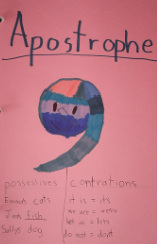
Because this is no mere plea for flexibility, it is an attack. Even as we roll our eyes, we tolerate – don’t we? – the misspelt signs outside the
greengrocer’s and celebrate the fact that we still have a greengrocer’s and the proprietor can calculate the bill in their head. But public institutions are
different. They need to follow the rules. The rules of grammar are there to make things easier for everyone. Yes even for those who don’t know how to work them.
At the beginning of each new term, I stand up with the rest of the choir and listen intently as the pianist plays the introductory bars of the music. I
watch the conductor but I don’t dare open my mouth when he gives us the signal to sing. I follow the dots on the page as best I can as the rest of them go through the first trial run. I know the very basics of the grammar
of music, but not nearly enough to join in until I’ve got at least the ghost of
the tune in my head.
Sometimes, looking at a mass of squiggles I thought I’d mastered the week before, I think it would be easier if none of us could read music, then we’d all be the same boat. I wouldn’t feel so stupid. But then there wouldn’t be anyone to explain what that little cap over that note means, and we wouldn’t be able to sing such complex music, or so much of it, because we’d have to learn it all by heart.
I wonder if those who are frustrated by grammar could be supported to recognise its value the way I appreciate my musical scores. I’ve still a bit more practice to put in before the concert, but I’ll be taking my place along with the other sopranos, tuned into the music with everything I’ve got. These are my favourite parts of the programme:
You can listen and follow the music to Locus iste (of course we sing it better). Or dance along to John Rutter’s Gloria.
Got to dash: I'm off to a rehearsal.





















 RSS Feed
RSS Feed





















